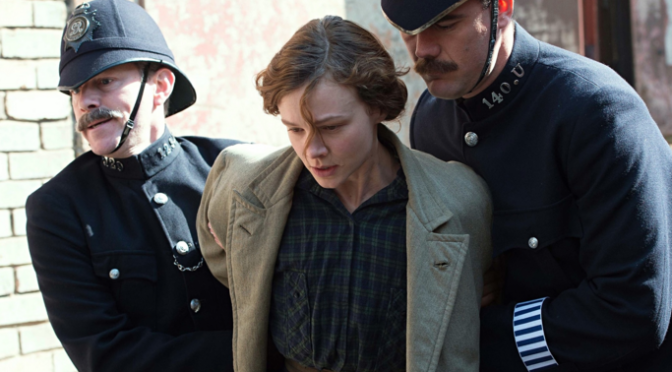Each time an election comes along, it’s easy to forget (especially for women) just how much blood, sweat and tears went into securing the right to vote. It’s easy to take for granted our ability to do so–especially in the current political landscape
As Sarah Gavron’s Suffragette opens with the rapidly turning wheel of a laundry machine in 1912 London, we’re immediately given a metaphor for how British women of this time must operate–always going, never stopping for pause to think about their aches, pains or woes. While the laundresses perform their grueling acts of drudgery, the voiceovers of enraged men responding to the suffragette movement make assertions like, “Women do not have the calmness of temperament or the balance of mind to exercise judgment in political affairs”; “If we allow women to vote, it will mean the loss of social structure. Women are well represented by their fathers, brothers, husbands”; and, “Once the vote was given, it would be impossible to stop at this. Women would then demand the right to becoming MPs, cabinet ministers, judges.” These narrow-minded oversimplifications aren’t even the half of what Emmeline Pankhurst’s (played by Meryl Streep, who seems to have an affinity for British women considering she also played Margaret Thatcher recently) legion of female followers devoted to the cause of “votes for women” must endure. Centered around the fictional character, Maud Watts (Carey Mulligan, who carries off the no makeup look better than most–no, that’s not a very feminist statement to make, but it’s true), the 24-year-old forewoman at the laundry and mother of a little boy named George, we’re shown just how inconsequentially the suffragettes are treated not only by members of Parliament, but by the men closest to them–particularly their husbands. Though Maud initially tries to shy away from controversy involving the suffragettes, her delivery of a package across town gets her unwittingly involved in the riot of a fellow washerwoman at her workplace, Violet Miller (Anne-Marie Duff). Simultaneously horrified and intoxicated by what the women of the movement are doing to get noticed, Maud finds herself at the center of it all when she has no choice but to give a statement in Violet’s place to David Lloyd George (Adrian Schiller) himself. While many believe Maud has managed to get through to the Chancellor of the Exchequer (if you’re American, don’t bother asking how that political role translates), the suffragettes are dealt yet another emotional blow when George denies their appeal to amend the law that speaks to the vote. In the wake of his rebuffing, the women riot in the streets, only to be met with extreme brutality from law enforcement. Among the ones caught and thrown into jail is Maud, whose husband, Sonny (Ben Whishaw), is chagrined to learn of what happened. The separation from her son for a week while serving out her sentence leaves Maud promising Sonny she’ll never take such a risk again. Sonny ominously insists, “You’ll never shame me again.” But, naturally the affinity she has with the other women rallying for the cause, including pharmacist a.k.a. the go-to bomb maker of the group, Edith Ellyn (Helena Bonham Carter, who rarely gets to showcase her serious acting chops), makes it impossible for Maud to resist joining in with them again. Eventually, the craving she has to bring the Women’s Social and Political Union to justice becomes so intense that she loses everything in order to fight for it. It is in this way that screenwriter Abi Morgan brings a unique arc to Maud’s character, who started out as the most resistant to the issue at hand, only to become one of the most militant of its members, making declarative statements like, “The law means nothing to me. I have no say in making the law. We break windows, we burn thing ’cause war’s the only language men listen to. ‘Cause you’ve beaten us and betrayed us and there’s nothing else left.” And, in the end, it’s when Maud has nothing left to lose that she’s got everything to gain.
The jarring conclusion to Suffragette shows a list of countries next to the year they permitted women to vote, which shockingly reveals how late to the game many nations have been–particularly Saudi Arabia. And so, with an election in the U.S. on the horizon, Suffragette shows us Americans (through the lens of our British foremothers) just how hard women had to fight for their right. Don’t waste it.





















